Overview
This article dives into how optimized influencer deal structures can really amp up the effectiveness and profitability of your influencer marketing campaigns. It points out that using AI-driven tools, like Creator Check, can streamline your operations, improve communication, and ultimately boost your revenue. Plus, it showcases some impressive time savings and increased campaign performance through real-life case studies. So, what does this mean for you? It’s all about making your campaigns more efficient and effective, and who wouldn’t want that?
Introduction
The influencer marketing landscape is really changing, moving away from the old-school celebrity endorsements to a more nuanced approach that embraces micro and nano influencers. As brands work to build authentic connections with consumers, the need for effective collaboration with social media personalities has never been more important.
But let’s be real—navigating the complexities of influencer deal management can be quite the challenge, especially with the industry projected to hit $32.55 billion by 2025.
So, how can agencies tap into innovative solutions to optimize deal structures and boost campaign performance in this fast-paced environment? Let’s dive into that!
Background: The Evolving Landscape of Influencer Marketing
Over the last decade, promotional strategies have really transformed. We’ve moved away from the old-school celebrity endorsements to a more intricate web that includes micro and nano influencers, brand ambassadors, and even AI-driven techniques. This change is largely because companies are recognizing just how important it is to form genuine connections with their consumers. As a result, there’s a growing demand for effective collaborations with social media personalities. Social media platforms have been game-changers in this shift, enabling influencers to connect directly with their audiences and fostering a more personal and relatable approach to promotion.
Now, the landscape is all about data-driven decision-making. Analytics are key for optimizing campaign performance and measuring return on investment (ROI). As brands lean towards smaller, more focused collaborations, picking the right partners and executing campaigns accurately becomes super important. Agencies need to navigate this evolving terrain skillfully to tap into the full potential of influencer marketing. It’s crucial to understand both the historical context and the current trends shaping the industry as we gear up for 2025. So, what does this mean for you? Let’s dive into how you can adapt and thrive in this new environment!
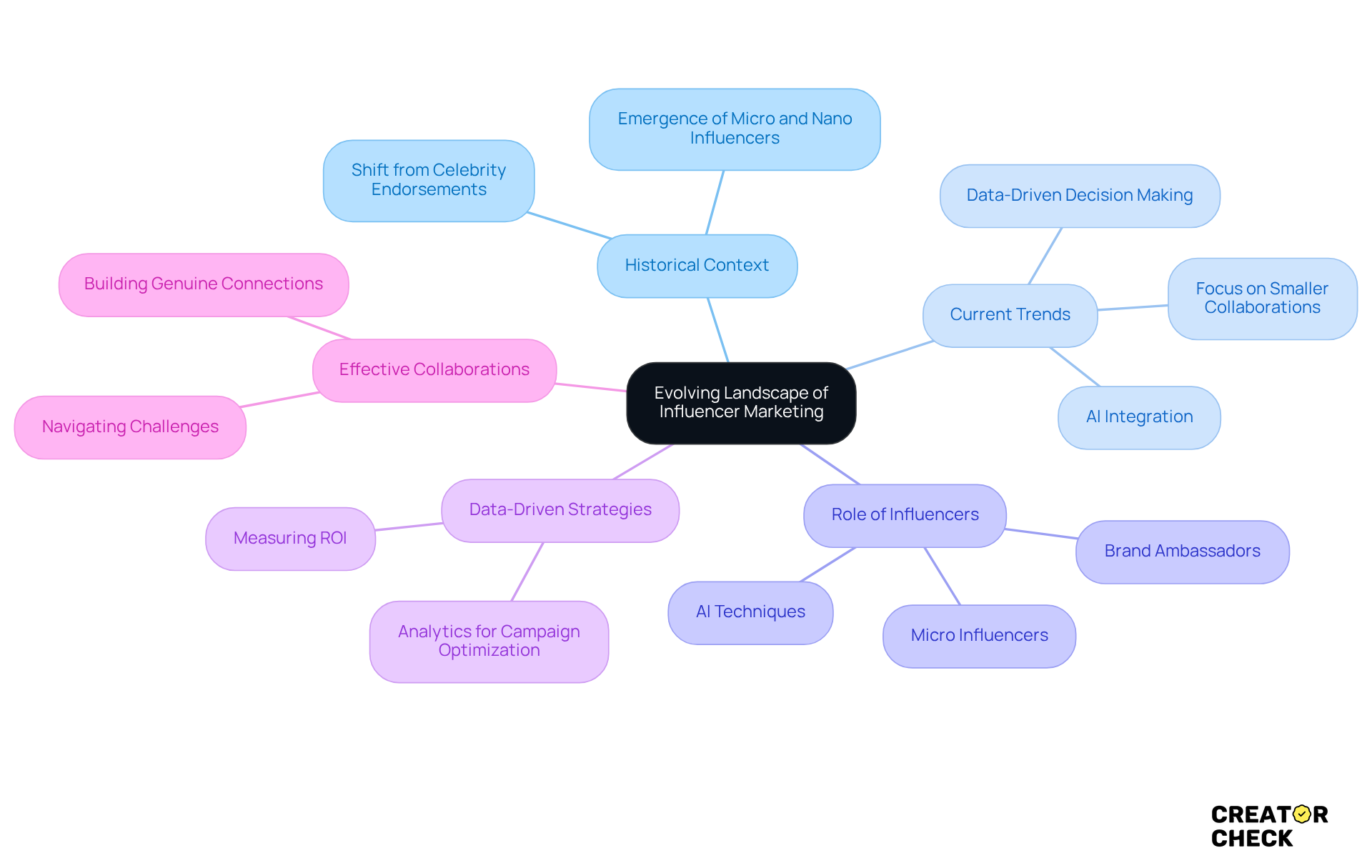
Challenges: Navigating Complexities in Influencer Deal Management
Managing influencer deals can be quite the juggling act for agencies, especially when you're balancing multiple campaigns and creators. You know the drill: the flood of emails, mixed messages, and the tricky business of negotiating contracts and payments. Did you know that 55% of creators say their biggest hurdle is figuring out and managing sponsorship agreements? Plus, a whopping 70% earn less than 10% of their total income from partnerships, highlighting the financial strain they often face.
Agencies often find themselves relying on a patchwork of tools—think spreadsheets and endless email threads—which can really slow things down and lead to some serious miscommunication. And without standardized procedures for managing collaborations with social media stars, it’s all too easy to miss out on opportunities and end up with less effective campaigns.
Then there’s the whole contract negotiation thing. It can get pretty complicated, and there are legal risks involved, especially when you have to comply with FTC regulations and GDPR to keep both brands and creators safe. As the influencer marketing scene heats up, with projections hitting $32.55 billion by the end of 2025, it’s clear that agencies need to tackle these challenges head-on, potentially by utilizing case studies on optimized influencer deal structures to help their creators shine and boost revenue.
So, what’s the solution? Enter Creator Check's AI-driven tools! These solutions can streamline your operations, manage those overflowing inboxes from different platforms, and ensure data privacy with top-notch encryption. Imagine spending less time wading through emails and more time locking down brand deals for your creators. By putting effective strategies for deal renewals into play and refining your processes, you can navigate these complexities with ease, as highlighted in case studies on optimized influencer deal structures, and really amp up your overall performance.
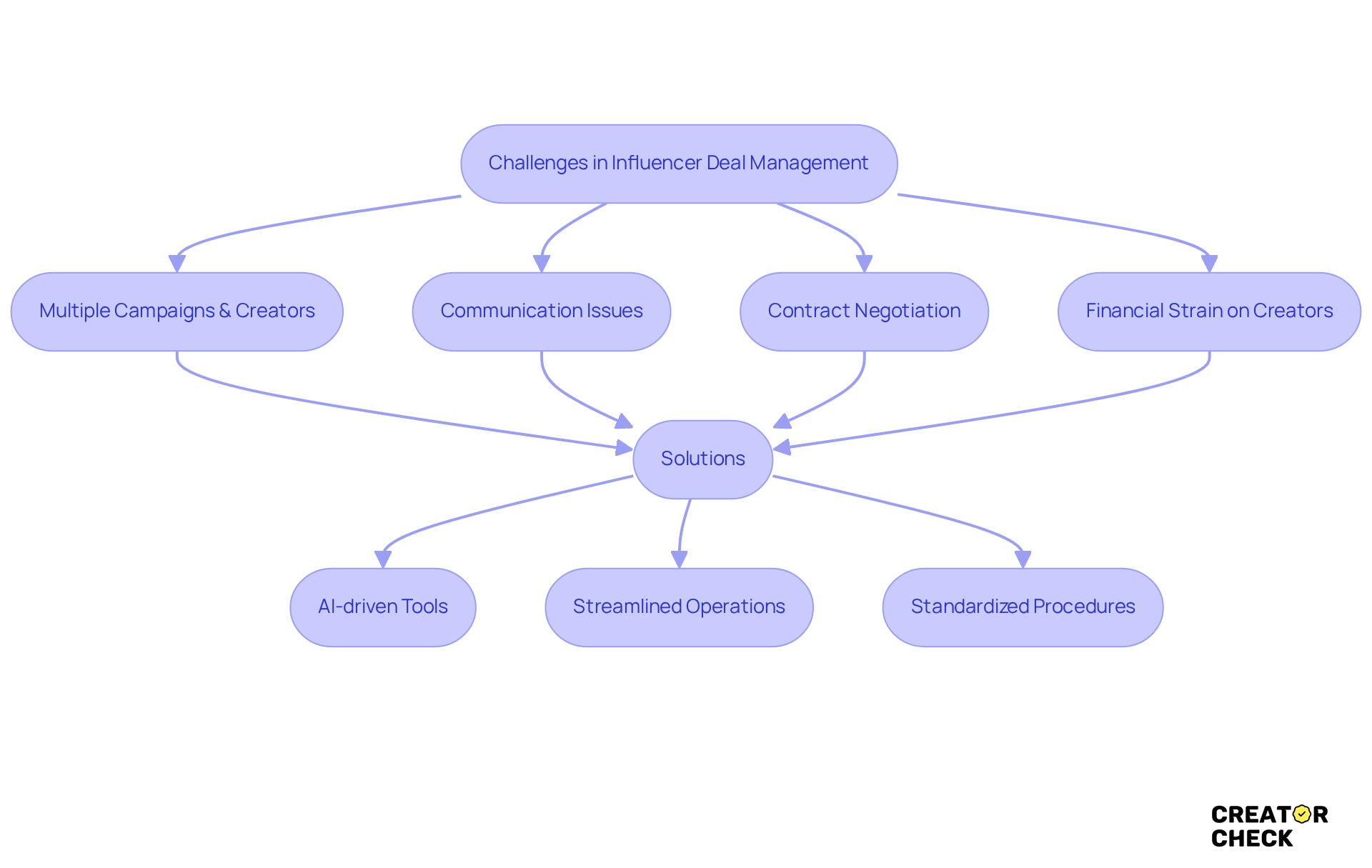
Solution Approach: Leveraging AI to Optimize Influencer Deal Structures
Agencies are really starting to embrace AI-driven solutions like Creator Check to tackle the tricky world of influencer deal management. This cool platform automates key processes like negotiations, outreach, and invoice management, which means less manual work for organizations. Plus, the AI-powered inbox makes communication a breeze by automatically tagging and prioritizing emails, so important messages don’t slip through the cracks.
And let’s not forget about the Brand Book feature, which ensures your messaging stays consistent across campaigns. Automated payment processing? It’s all about streamlining those financial transactions.
One of the standout features of Creator Check is its AI negotiator. This little gem crafts smarter counter-offers and helps secure higher-paying brand deals for creators. Not only does this save time, but it also lets organizations focus on building meaningful relationships with influencers. By bringing all these tasks together in one user-friendly interface, Creator Check boosts operational efficiency, helping organizations thrive in a competitive landscape.
Now, case studies on optimized influencer deal structures really demonstrate how AI can enhance promotion efficiency. For example, organizations using AI tools have seen significant boosts in lead generation and campaign performance. With the social media promotion sector expected to hit $32.55 billion by 2025, incorporating AI technologies is becoming essential for firms looking to up their game and maximize ROI. Experts are echoing this sentiment, highlighting how AI enhances marketing strategies and drives efficiency, all while aligning campaigns with broader business goals.
So, what does this mean for you? It’s clear that embracing AI isn’t just a trend; it’s becoming a crucial part of staying ahead in the game.
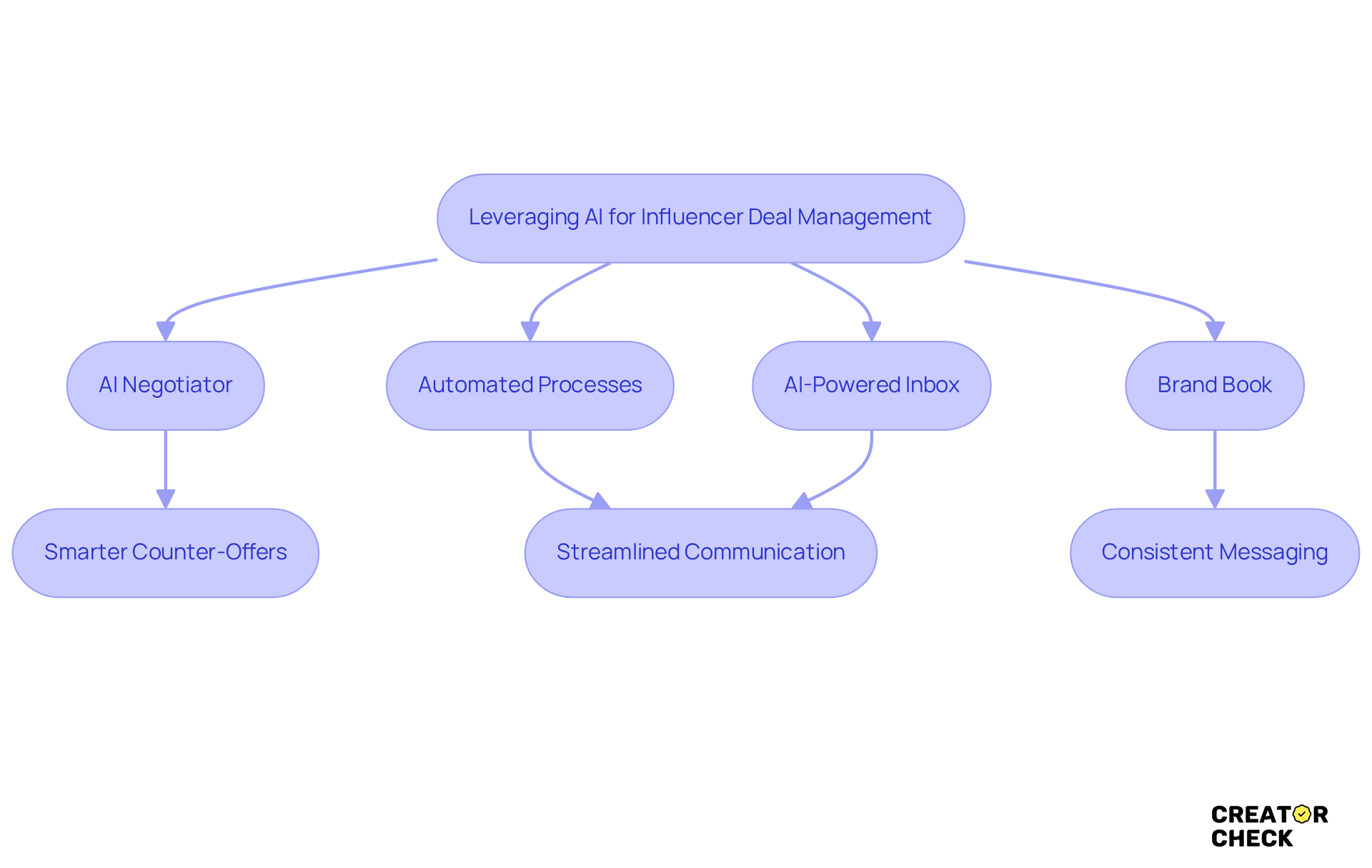
Results: Transformative Outcomes from Optimized Deal Structures
The adoption of AI-driven solutions through Creator Check has sparked some amazing changes for influencer firms. Have you noticed how many organizations are reporting significant time savings? Some are even cutting out up to 10 hours of manual labor each week! This newfound efficiency is directly tied to increased revenue, allowing organizations to focus on landing higher-paying deals and building stronger relationships with creators.
For instance, organization leaders have seen how the platform really simplifies operations. It improves overall workflow and helps create a more unified marketing strategy. Plus, the centralized management of campaigns—think features like the Brand Book that organizes and standardizes brand guidelines—has boosted communication and collaboration among team members. This sets organizations up to seize new opportunities in the ever-evolving social media landscape.
So, what does this mean for you? These organizations aren’t just growing continuously; they’re also raking in impressive revenue gains. On average, companies are generating about $5.78 for every dollar invested in marketing through social media personalities. This trend really highlights the crucial role AI tools play in enhancing deal structures, supported by case studies on optimized influencer deal structures, and maximizing organizational success. Isn’t it exciting to think about the possibilities?
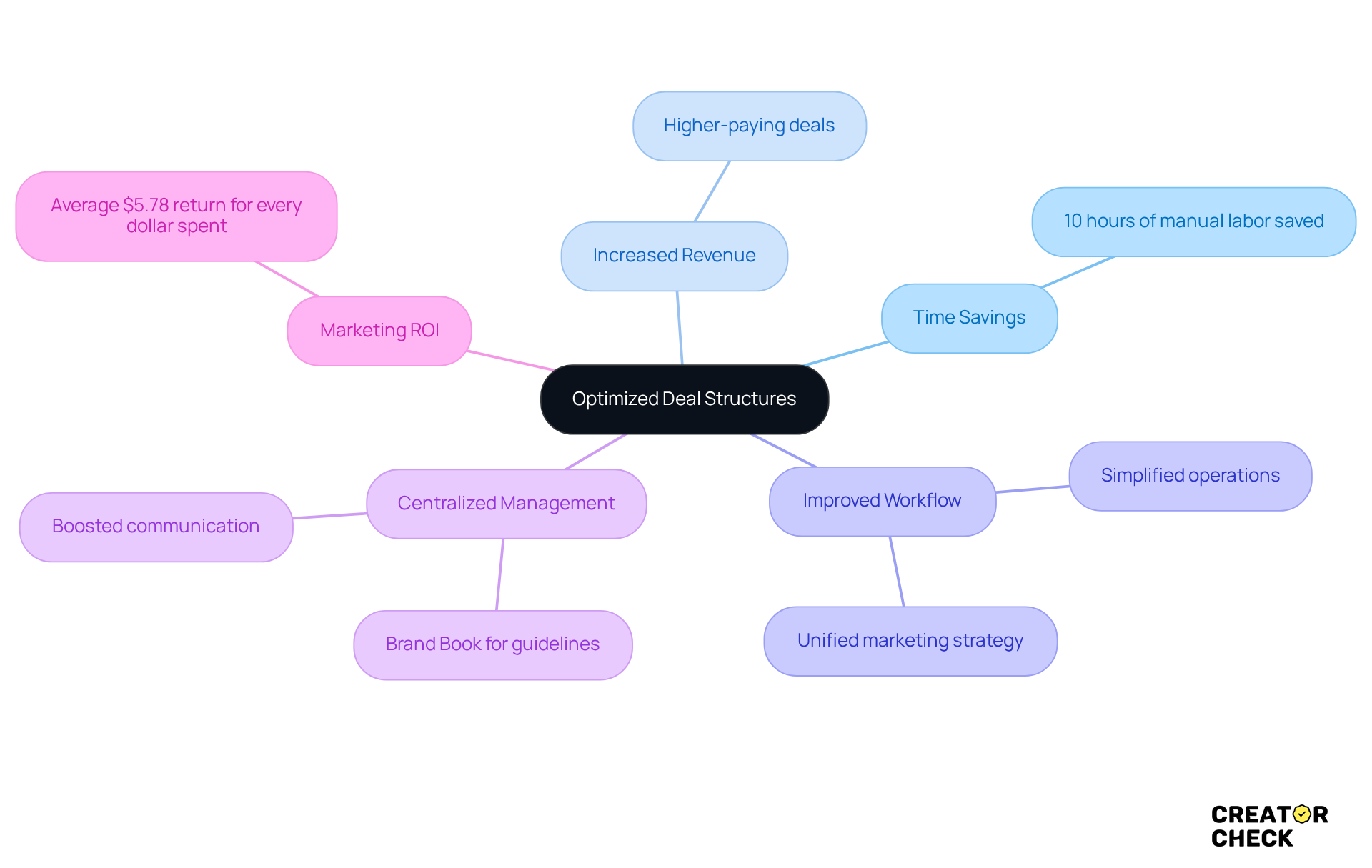
Insights: Lessons Learned and Future Directions in Influencer Marketing
This case study highlights some key insights derived from case studies on optimized influencer deal structures for firms looking to improve their deal arrangements.
First off, let’s talk about technology; it’s become absolutely essential. AI-driven solutions have shifted from being nice-to-haves to must-haves if you want to stay competitive. Take Creator Check, for example. It ensures email security and data privacy through enterprise-grade encryption, allowing organizations to manage sensitive information like pros. Plus, it can handle multiple inboxes from different providers and lets users search across all creator emails, which really streamlines operations.
Now, agencies need to tap into data analytics to steer their strategies. Making decisions based on solid data can really boost campaign performance. And don’t forget about building long-term relationships with influencers! It’s all about establishing trust and collaboration rather than just transactional interactions.
As the influencer marketing landscape keeps evolving, trends like AI influencers and the growing demand for authenticity are going to shape future strategies. So, what does this mean for you? Agencies that embrace these changes and stay agile will be the ones best positioned for success in the coming years.
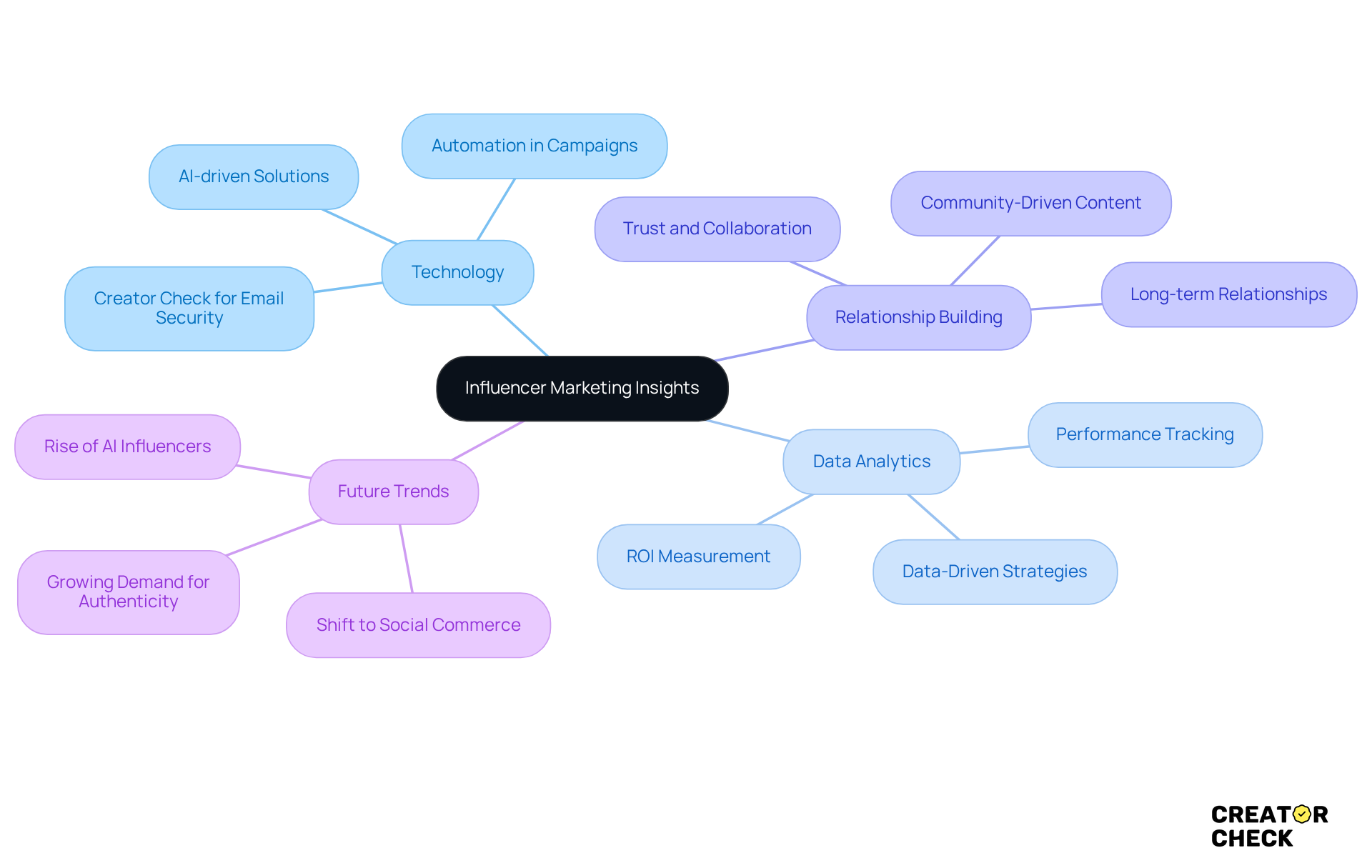
Conclusion
Exploring optimized influencer deal structures really highlights how important it is for brands to keep up with the fast-paced world of influencer marketing. As companies pivot to data-driven strategies and focus on genuine connections, using innovative tools like AI is becoming essential for navigating the complexities of influencer partnerships. The insights from this case study remind us how crucial it is to embrace technology to boost operational efficiency and foster successful collaborations.
Throughout the article, we've seen some key challenges agencies face when managing influencer deals—think communication hurdles and the tricky nature of contract negotiations. Enter AI-driven solutions like Creator Check, which can really help streamline these processes, cut down on manual work, and ultimately enhance revenue outcomes. Companies that have jumped on these technologies are not just saving time; they're also setting themselves up for greater financial success through optimized deal structures.
So, what does this mean for you? In the bigger picture, the shifting trends in influencer marketing stress the need for agencies to stay agile and ready to adapt. As the industry keeps evolving, embracing AI and focusing on building long-term relationships with influencers will be key to sustained success. The future of influencer marketing is full of potential, and those who actively engage with these advancements will be best positioned to thrive in this dynamic environment.
Frequently Asked Questions
How has influencer marketing evolved over the last decade?
Influencer marketing has shifted from traditional celebrity endorsements to include micro and nano influencers, brand ambassadors, and AI-driven techniques. This evolution is driven by the need for genuine connections with consumers and the ability of social media platforms to facilitate direct engagement between influencers and their audiences.
What role does data play in modern influencer marketing?
Data-driven decision-making is crucial in influencer marketing, as analytics help optimize campaign performance and measure return on investment (ROI). Brands are increasingly focusing on smaller, targeted collaborations, making it essential to choose the right partners and execute campaigns effectively.
What challenges do agencies face in managing influencer deals?
Agencies struggle with managing multiple campaigns and creators, dealing with a high volume of emails, and negotiating contracts and payments. Many creators find it difficult to manage sponsorship agreements, and a significant portion earns little from partnerships, leading to financial strain.
What tools do agencies currently use to manage influencer deals?
Agencies often rely on a combination of tools such as spreadsheets and email threads, which can slow down processes and lead to miscommunication. The lack of standardized procedures further complicates the management of collaborations.
What legal considerations must agencies keep in mind when managing influencer deals?
Agencies must navigate legal risks associated with contract negotiations and ensure compliance with regulations such as FTC guidelines and GDPR to protect both brands and creators.
How is the influencer marketing industry projected to grow?
The influencer marketing industry is projected to reach $32.55 billion by the end of 2025, highlighting the increasing importance of effective influencer collaborations.
What solutions are available to help agencies manage influencer deal complexities?
Creator Check's AI-driven tools can streamline operations, manage communications, and ensure data privacy. These solutions help agencies spend less time on administrative tasks and more time securing brand deals, while also providing strategies for deal renewals and optimized influencer deal structures.




